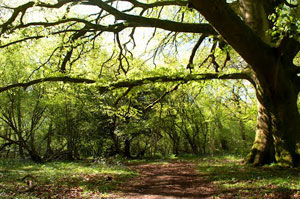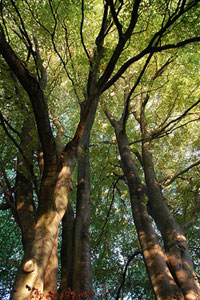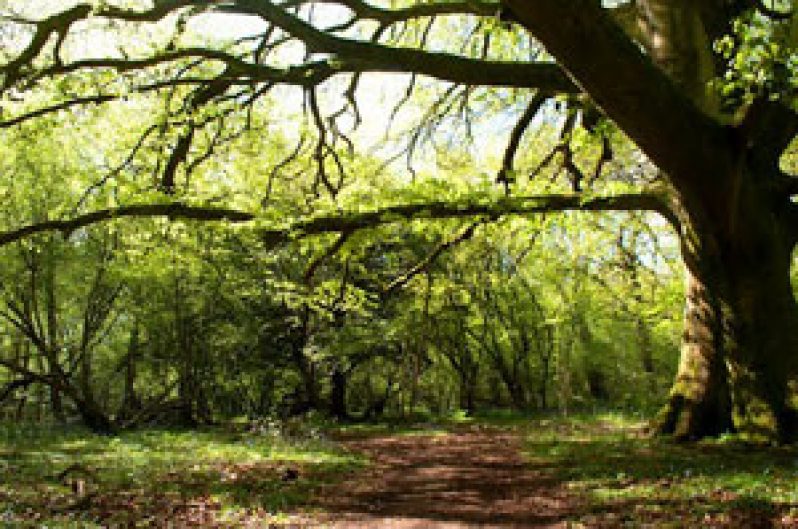The Crabwood tree, scientifically known Carapa guianensis is a member of the mahogany family .
Carapa is not known to many Guyanese on the coastland since it is a common element of the rainforest canopy found predominantly along rivers, on periodically flooded or swampy locations or on low hills of the hinterland.
 Quite a few Guyanese are, however, familiar with the product of this tree, ie: crab oil, internationally acclaimed for its strong medicinal and cosmetic properties.
Quite a few Guyanese are, however, familiar with the product of this tree, ie: crab oil, internationally acclaimed for its strong medicinal and cosmetic properties.
Carapa guianensis is a medium-sized to large tree up to 35m to a maximum of 55m tall.
The bole is straight and cylindrical up to 100cm to a maximum of 200cm in diameter and branchless up to 20m to a maximum of 30m.
The bark surface flakes into squarish scales or horizontal strips and is light grey to greyish brown or dark brown, sometimes reddish.
Young plants produce taproots but the trees tend to become surface rooted.
The fruits comprise a 4-lobed, pendulous woody capsule containing 2-4 seeds in each lobe.
The seeds are smooth, pale brown and angular.
Carapa is widely distributed throughout eastern Amazonia, the Guianas, Trinidad, and Central America as far north as Nicaragua.
It is found throughout Guyana, mainly in the marshlands of Region 1 (Barima/Waini) and Region 2 (Pomeroon/Supenaam) but large numbers can be found across the entire country for example at Iwokrama and Mabura.
A main attraction of the Crabwood tree is that it possesses the properties of the prized mahogany wood which is one of the most expensive woods in Guyana.
As a member of the mahogany family it is valued for high-quality furniture and cabinetwork, stairs and flooring, and as veneer for furniture, interior work and plywood.
 In the past some people living near to its natural habitat would cut down the trees willy-nilly and sell the wood to furniture manufacturers.
In the past some people living near to its natural habitat would cut down the trees willy-nilly and sell the wood to furniture manufacturers.
However, in recent years many others have grown to recognize that other properties of the Crabwood tree, namely the production of Crab oil from its seeds are equally, if not more valuable, than its use as wood for furniture.
Crab oil has properties as a mosquito repellent, hair oil for treatment of dandruffs, as an anti wrinkle cream, as a massage oil for treatment of rheumatism and arthritis and as a laxative among many others.
Many mothers in the know use Crab oil to treat a condition known locally as Thrush.
Interestingly, though the product is not so widely used in Guyana, commercialization of Crab oil has spread throughout the countries of the Amazon Region where the tree grows.
In Brazil, Europe and North America, Crab oil is traded under the name Andiroba oil.
In Guyana, thanks to the work of the conservationists such as the Guyana Marine Turtle Conservation Society (GMTCS), processing or sale of the seeds of the Crabwood tree for processing into Crab oil, has become a worthwhile income-generating activity to the extent that neighbouring communities are more active in conservation of the trees than in cutting them down.
People of the Waini, for example, now harvest the seeds during the two seasons annually, and sell the oil to the North West Organics Company (NWOC) formed by the conservationists of the GMTCS.
It was recently disclosed by the NWOC that some 50 gallons of Crab oil are bought every season, earning about US$2,500 for the Amerindians as against the US$1 per square foot they would have earned from cutting down the trees, selling them as logs and thereby losing their other more valuable benefits forever.
NWOC recently disclosed via its Website that the sale-ability of 100% natural Amazonian forest products, and the cultivation of an “ecological conscience” within the markets in the developed world, has caused a surge in the sales of crab oil on the world market.
Mixed with lavender and citronella oils, Crab oil is marketed as a relaxing, soothing, yet strong insect repellent. Combined with arnica and rosemary oils, it is promoted as a trauma massage and anti-rheumatic ointment.
Although there are some Guyanese who still believe that Crab oil comes from crabs, this non-toxic and odorless oil of the seeds of the Crabwood tree, is becoming much better known internationally with great potential for local producers and ample justification for its protection by legislative means.



.jpg)











